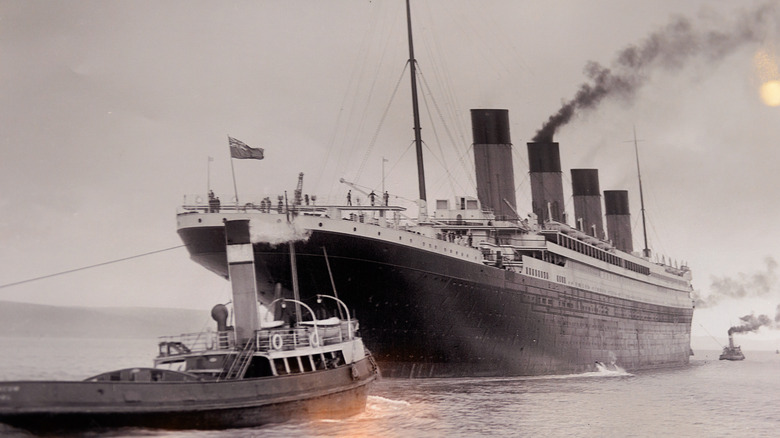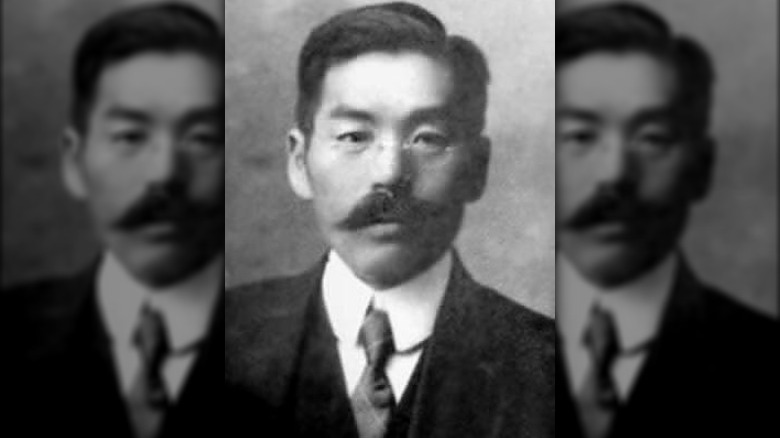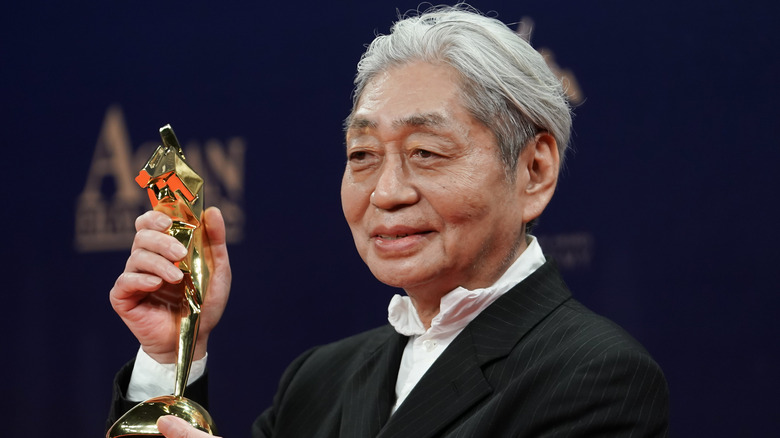Titanic's Only Japanese Survivor Was The Grandfather Of An Influential Musician
With a career that's spanned half a century and morphed through musical styles from psychedelic to folk to electronic, Haruomi Hosono is "one of the major architects of modern Japanese pop music," in the words of record label Light in the Attic. This means Japan's musical edifice would be a lot smaller if Hosono's grandfather hadn't made it onto a lifeboat one fateful night in 1912. That's right, the famous musician's grandfather was the only Japanese survivor of the Titanic.
Hosono's grandfather was a civil servant named Masabumi Hosono, according to Japan Today. He was born in 1870 and studied at the Tokyo Higher Commercial School and the Tokyo School of Foreign Languages, where he learned Russian, according to Encyclopedia Titanica. Perhaps because of his language skills, he was sent to Russia by the Japanese Ministry of Transportation in 1910 to study the railways there. Two years later, at the age of 42, he returned home, taking the roundabout Western route. After a brief stay in London, he boarded the Titanic.
2 spots left
Masabumi Hosono's experience the night the Titanic sank is recorded in detail. That's because he wrote about his survival in a letter to his wife on Titanic letterhead after he was rescued, according to the Encyclopedia Titanica. Hosono, who had a second-class ticket, awoke the night of the disaster to a knock on his door (via Encyclopedia Titanica). He approached the deck, where passengers were being loaded onto lifeboats, but was told to move to the lower decks because he was a foreigner. He managed to make his way back to the higher deck but was still trying to accept the likelihood that he would not survive. "I tried to prepare myself for the last moment with no agitation, making up my mind not to leave anything disgraceful as a Japanese. But still I found myself looking for and waiting for any possible chance for survival," he recalled.
His chance came when the officer in charge of one of the lifeboats called out that there was room for two more passengers. Another man then got on the boat. "I myself was deep in desolate thought that I would no more be able to see my beloved wife and children since there was no alternative for me than to share the same destiny as the Titanic," Hosono wrote in the letter (via Encyclopedia Titanica). "But the example of the first man making a jump led me to take this last chance." Eventually, his lifeboat was rescued by the Carpathia.
The consequences of survival
For Masabumi Hosono, survival was a mixed blessing. In the immediate aftermath, he went to the Mitsui trading company in New York, where old friends lent him money to return home, according to Encyclopedia Titanica. In Japan, he was interviewed by a few newspapers. However, the press soon turned against him as a male survivor of the disaster. An account by Norbert Zimmermann in "Titanic: Chronology of a Disaster," said that Japanese society was especially hostile to him because he had violated samurai values by not going down with the ship. However, in an article for Encyclopedia Titanica, Margaret Mehl said that samurai values had fallen out of fashion in Japan, and the country was more embarrassed by its sole survivor for ignoring the Western ideal of letting women and children escape first.
The hit to his reputation had consequences. He was fired from his job in 1913 and was cited as a bad example in an ethics textbook for children in the 1910s. However, he was rehired by the Ministry of Transportation as a contractor soon after. For the most part, Japanese society ignored his experience, and he also chose not to speak of it. Sometimes, his family would mention the impact of his survival, and he would respond, "I am alive here and now, what is wrong with that?" (via Encyclopedia Titanica). The letter in which he recounts his survival was published after his death in 1939.
Masabumi Hosono's legacy
However, Masabumi Hosono's story did not end in silence and shame. In 1969, his grandson Haruomi Hosono broke out into the music scene as part of the psychedelic band Apryl Fool, according to Light in the Attic. Since that time, he has been hugely influential and played with a variety of bands in a range of styles, from the folk-inspired Happy End to solo albums in the 1970s inspired by the jungle and exotica movements, to synthpop of the Yellow Magic Orchestra, according to Vice. "Hosono has defied near-every assumption about what it takes to make a lasting cultural impact, vaulting through styles, genres, and national identities to cement his status as one of the country's first truly global musicians," Rob Arcand wrote for Vice.
His grandfather's story had a second act too. When James Cameron's "Titanic" came out in 1997, Masabumi Hosono's letter was more widely publicized, according to "Titanic: Anatomy of a Blockbuster." It also became clear that Hosono had been mistaken in some press accounts for another Asian survivor in a different lifeboat, as the Associated Press reported at the time. It emerged that the other man had been placed in lifeboat 13, while Hosono survived in lifeboat 10. "I am extremely relieved," his grandson, Haruomi Hosono, said when the true story became better known. "Honour has been restored to the Hosonos," (via Titanic: Anatomy of a Blockbuster).



